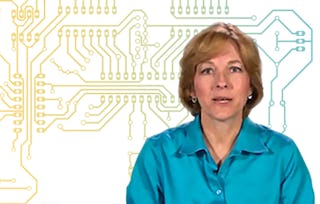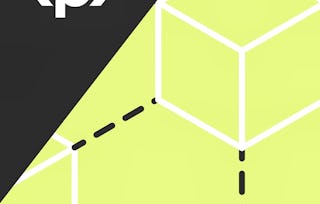Master the fundamental principles of electronic circuits and devices with this comprehensive course designed for aspiring electrical engineers, electronics enthusiasts, and hardware developers. Beginning with essential circuit elements, resistors, and power sources, you'll progress through systematic circuit analysis techniques including Kirchhoff's laws, nodal and mesh analysis, and network theorems like Thevenin's and Norton's equivalents. The course covers both time-domain analysis of RL, RC, and RLC circuits and frequency-domain techniques using phasor algebra for AC circuit analysis. You'll explore semiconductor devices including diodes for signal shaping and voltage regulation, bipolar junction transistors (BJTs) for amplification and switching, MOSFETs for low-power applications, and operational amplifiers (op-amps) for building complex signal processing circuits. Through hands-on problem-solving and practical applications, you'll learn to design power circuits, calculate power factors in AC systems, and implement digital switching circuits. Whether you're preparing for advanced studies in electrical engineering, developing IoT devices, or pursuing careers in electronics design and embedded systems, this course provides the essential foundation in circuit theory, semiconductor physics, and analog electronics needed to analyze, design, and troubleshoot electronic systems across diverse engineering applications.

Basic Electronics

Recommended experience
What you'll learn
Analyze circuits using Kirchhoff's laws, nodal and mesh techniques, and network theorems for systematic problem-solving.
Design amplifiers and switching circuits with diodes, BJTs, and MOSFETs for signal processing and power applications.
Apply phasor algebra for AC circuit analysis and calculate power factors to optimize electrical system performance.
Build operational amplifier circuits for signal conditioning, arithmetic operations, and advanced analog applications.
Skills you'll gain
Details to know

Add to your LinkedIn profile
November 2025
84 assignments
See how employees at top companies are mastering in-demand skills

There are 10 modules in this course
This module introduces you to basic electronics. You will learn about the basic elements of electronic circuits, focusing on resistors and varied power sources. You will gain insights into simple laws for circuit analysis, such as Kirchhoff’s current law (KCL), Kirchhoff’s voltage law (KVL), and Ohm’s law.
What's included
10 videos11 readings8 assignments
In this module, you will learn about two basic circuit analysis techniques, nodal and mesh, to decipher circuits in a consistent and methodical approach. You will analyze complex electrical circuits in a simple systematic approach using nodal and mesh analysis. You will also solve electrical circuit problems using nodal and mesh analysis.
What's included
8 videos10 readings7 assignments
In this module, you will learn about circuit simplification techniques, including Thevenin’s and Norton’s theorems. You will know how to represent large circuit blocks with simple equivalents. You will learn about the superposition theorem to examine the effects of multiple power sources on circuit performance. You will also learn about the maximum power transfer theorem to analyze and apply techniques to optimally fire up circuit loads.
What's included
9 videos7 readings10 assignments
In this module, you will learn about other common circuit elements, like inductors (L) and capacitors (C), which have time-dependent responses to electrical stimuli. You will learn how to estimate the time-dependent response to DC excitation. You will learn to analyze circuits with resistors (R), inductors (L), capacitors (C), and combinations thereof.
What's included
10 videos5 readings11 assignments
In this module, you will be able to represent the circuit elements in the frequency/phasor domain and apply previous circuit analysis techniques to circuits with sinusoidal (AC) power sources. You will learn how representation as a phasor aids in quickly analyzing circuits and understanding the impact on the circuit function. You will also learn the concepts of impedance and admittance of circuits.
What's included
8 videos8 readings9 assignments
In this module, you will learn the difference between average, apparent, and reactive power. These impact the power consumption in your system. You will learn the significance of the power factor and its impact on AC circuit performance.
What's included
7 videos5 readings8 assignments
This module introduces you to the non-linear circuit element, the diode. You will gain insights into two types of diodes, the simple p-n junction, and Zener diodes. You will examine its I-V characteristics and explore the application of these diodes in signal shaping and power circuits.
What's included
6 videos6 readings7 assignments
In this module, you will learn about the three-terminal devices or transistors and their discovery. You will know the working of the bipolar junction transistor (BJT). You will learn about the output and transfer characteristics of the device BJT. You will apply this knowledge to understand the working of a simple amplifier and digital circuits.
What's included
7 videos7 readings8 assignments
In this module, you will learn about metal-oxide-semiconductor-field-effect transistors (MOSFETS). You will learn about their output and transfer characteristics. You will learn the difference in operation and use of these transistors compared to BJT. You will also learn to build basic circuits using these devices for signal amplification and digital switching.
What's included
6 videos7 readings7 assignments
In this module, you will learn about a powerful abstraction of the operational amplifier and its properties. You will learn to construct complex circuits using this simple, abstract model. You will also learn about circuit design blocks that use operational amplifiers (OPAMPs).
What's included
8 videos10 readings9 assignments
Instructor

Explore more from Electrical Engineering
 Status: Preview
Status: PreviewGeorgia Institute of Technology
 Status: Preview
Status: Preview Status: Free Trial
Status: Free Trial
Why people choose Coursera for their career

Felipe M.

Jennifer J.

Larry W.

Chaitanya A.

Open new doors with Coursera Plus
Unlimited access to 10,000+ world-class courses, hands-on projects, and job-ready certificate programs - all included in your subscription
Advance your career with an online degree
Earn a degree from world-class universities - 100% online
Join over 3,400 global companies that choose Coursera for Business
Upskill your employees to excel in the digital economy
Frequently asked questions
To access the course materials, assignments and to earn a Certificate, you will need to purchase the Certificate experience when you enroll in a course. You can try a Free Trial instead, or apply for Financial Aid. The course may offer 'Full Course, No Certificate' instead. This option lets you see all course materials, submit required assessments, and get a final grade. This also means that you will not be able to purchase a Certificate experience.
When you enroll in the course, you get access to all of the courses in the Specialization, and you earn a certificate when you complete the work. Your electronic Certificate will be added to your Accomplishments page - from there, you can print your Certificate or add it to your LinkedIn profile.
Yes. In select learning programs, you can apply for financial aid or a scholarship if you can’t afford the enrollment fee. If fin aid or scholarship is available for your learning program selection, you’ll find a link to apply on the description page.
More questions
Financial aid available,


